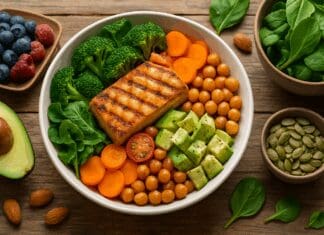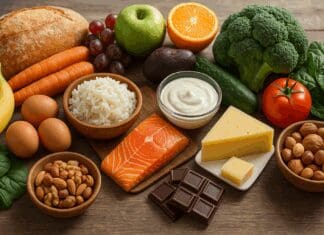Healthy Eating Habits
Developing sustainable healthy eating habits is crucial for long-term well-being. In the Healthy Eating Habits section, we focus on simple yet effective strategies for making nutritious choices that become second nature. From mindful eating and portion control to choosing whole foods, this guide provides practical tips to help you build lasting healthy eating routines that support weight management, improve digestion, and boost energy levels.
The pursuit of optimal health and vitality begins with the daily decisions we make at the dining table. For women, whose nutritional needs shift across different life stages—from adolescence and childbearing years to menopause and beyond—making informed dietary choices is both empowering and essential. Embracing a lifestyle that prioritizes healthy food for ladies can significantly enhance energy levels, hormonal balance, immunity, and mental clarity. But beyond just eating “right,” it’s about selecting foods that fuel the female body with purpose, honoring its complex rhythms and supporting long-term wellness goals.
In today's health-obsessed culture, the word "diet" is often tossed around casually, yet few pause to ask: what does diet mean in its truest and most comprehensive sense? While many associate it narrowly with weight loss or restrictive eating patterns, the actual concept of diet stretches far beyond these limited interpretations. Understanding the full scope of this term is essential for developing sustainable habits that support both physical and mental well-being. A deeper look at what diet means reveals a more nuanced and empowering approach to nutrition, one that transcends fads and emphasizes lifelong vitality.
In an age where food choices abound and dietary trends shift with dizzying speed, the value of understanding the nutrition definition becomes not just relevant but essential. Knowing what nutrition really means—beyond calorie counts or fad diet rules—lays the foundation for making smarter, more intentional choices about what we eat. Nutrition is not merely about eating less or following rigid plans; it’s about equipping the body with the necessary building blocks to sustain life, prevent disease, and optimize function. To truly embrace healthy eating habits, we must first demystify what we mean by “nutrition” and examine how this understanding can empower better daily decisions. This comprehensive guide will unpack the key principles of nutrition from a biological, psychological, and practical lens, offering expert insights into how knowledge translates into lifelong well-being.
Navigating life in your 20s is an exciting yet complex journey. As independence, career choices, and lifestyle habits take root, so do the decisions that shape your long-term health. Establishing a healthy diet for women in 20s is not just about aesthetics or short-term wellness; it is the cornerstone of disease prevention, hormonal balance, fertility health, and metabolic resilience. The choices made during this critical decade echo into the years ahead, influencing bone density, cardiovascular function, mental clarity, and reproductive health.
Adopting a no red meat diet is an increasingly popular choice for individuals striving to improve their overall health, manage chronic conditions, and promote sustainable dietary habits. As research continues to shed light on the health implications of red meat consumption, particularly processed and high-fat varieties, more people are turning toward plant-based or diversified meat and vegetable diet patterns that limit or eliminate red meat altogether. This transition not only aligns with health-conscious goals but also reflects growing awareness of environmental sustainability and animal welfare. For those considering dietary changes, understanding the nuances and benefits of a no red meat diet is essential to making informed, health-positive decisions.
The question of “is it okay to eat” certain common foods every day has moved beyond casual curiosity into a subject of intense interest for both consumers and nutritionists alike. In a world where dietary guidance can change overnight, many individuals are left wondering whether their daily food routines are helping or harming their health. From bananas and eggs to bread and yogurt, the foods we regularly consume hold a complex mix of benefits and potential drawbacks. At the heart of this exploration lies the science of dietary frequency—how often we eat specific foods and how that rhythm aligns with our nutritional needs, metabolism, and long-term health outcomes.
The decision to radically overhaul my eating habits did not come lightly. After a period of feeling sluggish, gaining a few unwanted pounds, and watching my energy levels dip, I was in search of a structured, no-nonsense eating plan. That’s when I stumbled across the military diet, an eating regimen that promises rapid weight loss through a highly controlled meal plan spread across a short time frame. At first glance, the approach appeared straightforward and cost-effective—so I committed to an unconventional experiment: I did the military diet for a month.
In an age of accelerating medical advancements and wellness trends, one enduring truth remains clear: nutrition is the cornerstone of lasting health and vitality. While there are countless debates about dietary styles—vegan versus keto, intermittent fasting versus small frequent meals—what transcends these distinctions is the underlying principle that nutrition fuels the body and mind. Understanding why is nutrition important means recognizing its role not only in disease prevention but also in optimizing energy, enhancing mood, supporting cognition, and sustaining cellular renewal throughout every stage of life.
Achieving vibrant, long-lasting health requires more than occasional self-care or sporadic exercise—it demands intentional daily nourishment that aligns with a woman’s unique biological and lifestyle needs. In this context, focusing on essential nutrition tips to support womens daily health goals becomes not just a matter of dietary choice but a strategy for sustaining energy, mood, hormonal balance, and long-term disease prevention. The human body—particularly the female body—requires specific nutrients in particular ratios to function at its peak across every stage of life, from menstruation and pregnancy to menopause and beyond. Whether you're a college graduate entering the workforce or a seasoned professional balancing career, family, and personal ambitions, adopting the right nutritional strategies is critical for mental clarity, immunity, reproductive health, and vitality.
In an era marked by increasing reliance on convenience and ultra-processed foods, many individuals are turning to more natural eating practices to restore vitality, prevent chronic disease, and elevate overall health. A thoughtfully designed whole food diet meal plan offers a sustainable, evidence-based strategy for achieving these goals by prioritizing nutrient-rich, unrefined ingredients in their most natural state. Unlike fad diets that promote rapid results at the expense of health or enjoyment, a whole food approach cultivates long-term wellness by focusing on quality, simplicity, and balance. For those seeking lasting energy and resilience against lifestyle-related conditions, adopting a whole food diet represents not just a dietary choice but a profound lifestyle transformation.












